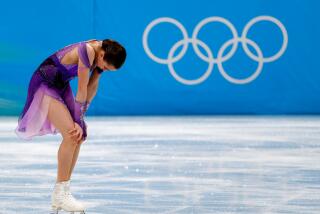Cassell: TAC Drug Tests Consistent : Track and field: But he says international system might be found lacking.
- Share via
U.S. track and field’s top official said Thursday that there have been no inconsistencies in their drug enforcement policies but suggested there could be some at the international level.
Ollan C. Cassell, executive director of The Athletics Congress, the U.S. governing body for track, defended his group’s drug-testing record, and said he cannot account for punishment leveled by the International Amateur Athletic Federation, the worldwide governing body.
Cassell, also an IAAF vice president, was responding to a Times’ article on June 12. That story reported that, according to confidential memos Cassell wrote, he voided two positive tests for banned stimulants found in over-the-counter cold medications.
Earlier this month, the IAAF announced the three-month suspension of Nigeria’s Joseph Taiwo, a two-time Olympic triple jumper, who tested positive in a January indoor meet at Portland, Ore., for pseudoephedrine, a banned drug found in cold medications.
Two other foreign athletes who tested positive for stimulants at U.S. indoor meets last winter were not suspended by the IAAF.
Two U.S. athletes also found with the substance in their systems at the Portland meet were excused by Cassell for the so-called inadvertent use rule, which further clouds the issue. Inadvertent use allows for athletes who actually use medications to combat colds. The rule, however, was not one of TAC’s law when Cassell used it to void the tests.
IAAF officials could not be reached Thursday night in London.
“There has been no effort to hide any tests,” Cassell said in a telephone news conference from Indianapolis. “There has been no mishandling of any cases.”
Cassell said the confusion lies within the IAAF, which did not recommend suspension of a Canadian athlete whose case was similar to Taiwo’s.
“They treated them inconsistently,” Cassell said.
Perhaps the biggest question is what standard level is used for a test to be considered positive. Taiwo was suspended for a level of one-10 micrograms per milliliter of pseudoephedrine. The Canadian athlete fell within that level, as did U.S. athletes.
Cassell declared such levels to be negative in the cases of the Americans. He said such a decision was consistent with the IAAF policy at the time.
In a recent revision, IAAF officials instituted new standards for positives: a level of five or above for the stimulant ephedrine, and a level 10 or above for pseudoephedrine and phenylpropalamine.
“It seems to me we have followed proper procedures,” Cassell said.
Cassell further defended TAC’s extensive program, which entails out-of-competition and in-competition year-round drug testing of its athletes. He said no positive cases were misplaced, but admitted “there might have been some slippage at times, but none slipped through the cracks.”
Cassell, whose leadership has been under siege by disgruntled members of TAC, said the group wants to transfer its drug-testing program to the U.S. Olympic Committee to facilitate procedures. He said it is not because of his dissatisfaction with the program, which he called the most comprehensive in the world’s sporting community.
More to Read
Go beyond the scoreboard
Get the latest on L.A.'s teams in the daily Sports Report newsletter.
You may occasionally receive promotional content from the Los Angeles Times.






